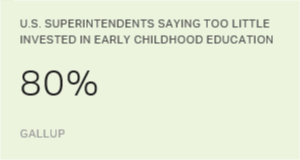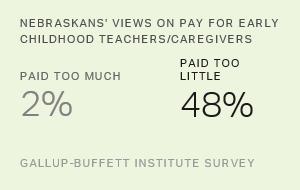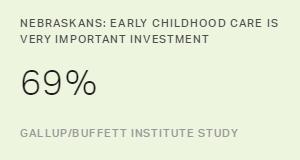Story Highlights
- 80% of U.S. superintendents report too little investment in early education
- 16% say most children are prepared for success when they start kindergarten
- Urban district leaders least likely to say quality early education is available
WASHINGTON, D.C. -- The majority of U.S. public school superintendents (80%) say their state is investing too little in early childhood care and education programs, while just 2% believe their state is investing too much and 15% report the level of investment is about right.
| U.S. public school superintendents | |||||||||||||||||||||||||||||||||||||||||||||||||||||||||||||||||||||||||||||||||||||||||||||||||||
|---|---|---|---|---|---|---|---|---|---|---|---|---|---|---|---|---|---|---|---|---|---|---|---|---|---|---|---|---|---|---|---|---|---|---|---|---|---|---|---|---|---|---|---|---|---|---|---|---|---|---|---|---|---|---|---|---|---|---|---|---|---|---|---|---|---|---|---|---|---|---|---|---|---|---|---|---|---|---|---|---|---|---|---|---|---|---|---|---|---|---|---|---|---|---|---|---|---|---|---|
| % | |||||||||||||||||||||||||||||||||||||||||||||||||||||||||||||||||||||||||||||||||||||||||||||||||||
| Too little | 80 | ||||||||||||||||||||||||||||||||||||||||||||||||||||||||||||||||||||||||||||||||||||||||||||||||||
| About the right amount | 15 | ||||||||||||||||||||||||||||||||||||||||||||||||||||||||||||||||||||||||||||||||||||||||||||||||||
| Too much | 2 | ||||||||||||||||||||||||||||||||||||||||||||||||||||||||||||||||||||||||||||||||||||||||||||||||||
| Don't know | 2 | ||||||||||||||||||||||||||||||||||||||||||||||||||||||||||||||||||||||||||||||||||||||||||||||||||
| Gallup | |||||||||||||||||||||||||||||||||||||||||||||||||||||||||||||||||||||||||||||||||||||||||||||||||||
These results are from a survey of U.S. public school superintendents conducted by Gallup June 15-July 9, 2017.
Not only do the majority of public school superintendents say investment in these programs is inadequate, but about as many (77%) also say early childhood care and education has "a great deal" of impact on the long-term success of students in school -- underscoring its perceived importance.
| U.S. public school superintendents | |||||||||||||||||||||||||||||||||||||||||||||||||||||||||||||||||||||||||||||||||||||||||||||||||||
|---|---|---|---|---|---|---|---|---|---|---|---|---|---|---|---|---|---|---|---|---|---|---|---|---|---|---|---|---|---|---|---|---|---|---|---|---|---|---|---|---|---|---|---|---|---|---|---|---|---|---|---|---|---|---|---|---|---|---|---|---|---|---|---|---|---|---|---|---|---|---|---|---|---|---|---|---|---|---|---|---|---|---|---|---|---|---|---|---|---|---|---|---|---|---|---|---|---|---|---|
| % | |||||||||||||||||||||||||||||||||||||||||||||||||||||||||||||||||||||||||||||||||||||||||||||||||||
| A great deal | 77 | ||||||||||||||||||||||||||||||||||||||||||||||||||||||||||||||||||||||||||||||||||||||||||||||||||
| A fair amount | 18 | ||||||||||||||||||||||||||||||||||||||||||||||||||||||||||||||||||||||||||||||||||||||||||||||||||
| Not much | 3 | ||||||||||||||||||||||||||||||||||||||||||||||||||||||||||||||||||||||||||||||||||||||||||||||||||
| None at all | 1 | ||||||||||||||||||||||||||||||||||||||||||||||||||||||||||||||||||||||||||||||||||||||||||||||||||
| Don't know | 1 | ||||||||||||||||||||||||||||||||||||||||||||||||||||||||||||||||||||||||||||||||||||||||||||||||||
| Gallup | |||||||||||||||||||||||||||||||||||||||||||||||||||||||||||||||||||||||||||||||||||||||||||||||||||

Optimize Your School
Engage students to help them get the most out of their education.
Little Access to High-Quality Early Care in All District Types
Few superintendents agree or strongly agree (16%) that high-quality early childhood care and education is available to every family in their state -- with far more, 63%, saying they disagree or strongly disagree. At most, 20% of superintendents from city, suburban, town and rural school districts agree that high-quality early education is available for all families, with those from city school districts least likely to agree or strongly agree (8%).
| All | City | Suburban | Town | Rural | |||||||||||||||||||||||||||||||||||||||||||||||||||||||||||||||||||||||||||||||||||||||||||||||
|---|---|---|---|---|---|---|---|---|---|---|---|---|---|---|---|---|---|---|---|---|---|---|---|---|---|---|---|---|---|---|---|---|---|---|---|---|---|---|---|---|---|---|---|---|---|---|---|---|---|---|---|---|---|---|---|---|---|---|---|---|---|---|---|---|---|---|---|---|---|---|---|---|---|---|---|---|---|---|---|---|---|---|---|---|---|---|---|---|---|---|---|---|---|---|---|---|---|---|---|
| % | % | % | % | % | |||||||||||||||||||||||||||||||||||||||||||||||||||||||||||||||||||||||||||||||||||||||||||||||
| 5 (Strongly agree) / 4 | 16 | 8 | 14 | 19 | 20 | ||||||||||||||||||||||||||||||||||||||||||||||||||||||||||||||||||||||||||||||||||||||||||||||
| 3 | 18 | 11 | 16 | 17 | 21 | ||||||||||||||||||||||||||||||||||||||||||||||||||||||||||||||||||||||||||||||||||||||||||||||
| 1 (Strongly disagree) / 2 | 63 | 79 | 68 | 61 | 56 | ||||||||||||||||||||||||||||||||||||||||||||||||||||||||||||||||||||||||||||||||||||||||||||||
| Don't know | 3 | 2 | 3 | 2 | 3 | ||||||||||||||||||||||||||||||||||||||||||||||||||||||||||||||||||||||||||||||||||||||||||||||
| Asked of U.S. public school superintendents | |||||||||||||||||||||||||||||||||||||||||||||||||||||||||||||||||||||||||||||||||||||||||||||||||||
| Gallup | |||||||||||||||||||||||||||||||||||||||||||||||||||||||||||||||||||||||||||||||||||||||||||||||||||
Superintendents' concerns about the lack of availability of early childhood education and state under-investment may help explain why relatively few (16%) of these officials say that most young children in their state are prepared to be successful when they start kindergarten. No more than 18% of superintendents from city, suburban, town and rural school districts agree or strongly agree that their state's children are prepared to be successful in school when they start kindergarten. Superintendents in city districts are the most pessimistic, with only 9% agreeing that their state's children are prepared to succeed when they start kindergarten.
| All | City | Suburban | Town | Rural | |||||||||||||||||||||||||||||||||||||||||||||||||||||||||||||||||||||||||||||||||||||||||||||||
|---|---|---|---|---|---|---|---|---|---|---|---|---|---|---|---|---|---|---|---|---|---|---|---|---|---|---|---|---|---|---|---|---|---|---|---|---|---|---|---|---|---|---|---|---|---|---|---|---|---|---|---|---|---|---|---|---|---|---|---|---|---|---|---|---|---|---|---|---|---|---|---|---|---|---|---|---|---|---|---|---|---|---|---|---|---|---|---|---|---|---|---|---|---|---|---|---|---|---|---|
| % | % | % | % | % | |||||||||||||||||||||||||||||||||||||||||||||||||||||||||||||||||||||||||||||||||||||||||||||||
| 5 (Strongly agree) / 4 | 16 | 9 | 15 | 14 | 18 | ||||||||||||||||||||||||||||||||||||||||||||||||||||||||||||||||||||||||||||||||||||||||||||||
| 3 | 29 | 21 | 27 | 33 | 31 | ||||||||||||||||||||||||||||||||||||||||||||||||||||||||||||||||||||||||||||||||||||||||||||||
| 1 (Strongly disagree) / 2 | 53 | 69 | 53 | 51 | 50 | ||||||||||||||||||||||||||||||||||||||||||||||||||||||||||||||||||||||||||||||||||||||||||||||
| Don't know | 3 | 2 | 6 | 2 | 1 | ||||||||||||||||||||||||||||||||||||||||||||||||||||||||||||||||||||||||||||||||||||||||||||||
| Asked of U.S. public school superintendents | |||||||||||||||||||||||||||||||||||||||||||||||||||||||||||||||||||||||||||||||||||||||||||||||||||
| Gallup | |||||||||||||||||||||||||||||||||||||||||||||||||||||||||||||||||||||||||||||||||||||||||||||||||||
Implications
U.S. public school superintendents are in accord that early childhood care and education affects students' long-term success in school, a position well-supported in early childhood research. However, few of these leaders say most young children in their state are getting the early preparation they need. Superintendents from city school districts, which tend to have more families living at or below the poverty level, are least likely to agree that children in their state are prepared for school success when they begin kindergarten.
Superintendents' views that young children in their state are not prepared for school success may stem from their understanding that there is a lack of access to quality early childhood care and education programs. A majority of superintendents note a lack of state investment in these often-costly programs, leaving many families to find and pay for the care and education of their young children. This places a particular burden on low-income families.
In an effort to alleviate this burden and expand access, New York City Mayor Bill de Blasio announced in April that his city will provide free early childhood education for all 3-year-olds within four years. The program will expand the existing universal prekindergarten program for 4-year-olds initiated by de Blasio in 2015. Just a few states, including Florida, Georgia, Oklahoma and West Virginia, offer universal prekindergarten for 4-year-olds.
While the costs of implementing high-quality early childhood care and education are significant, the costs to children of neglecting to provide these programs -- especially to those from low-income families -- multiply as students journey through school.
Survey Methods
This survey is an attempted census of U.S. public school district superintendents. Gallup used a purchased sample list of 12,432 K-12 school districts across the U.S. to email their superintendents to invite them to participate in a web survey. Gallup conducted 2,326 web interviews June 15-July 9, 2017, achieving a 19% response rate. The sample of superintendents was weighted to correct for possible nonresponse bias by matching the obtained sample to targets for all U.S. school districts from the National Center for Education Statistics database on district enrollment, geographical region and location of the district in a city, suburb, town or rural area. The weighted sample thus can be projected to represent public school district superintendents nationwide.




